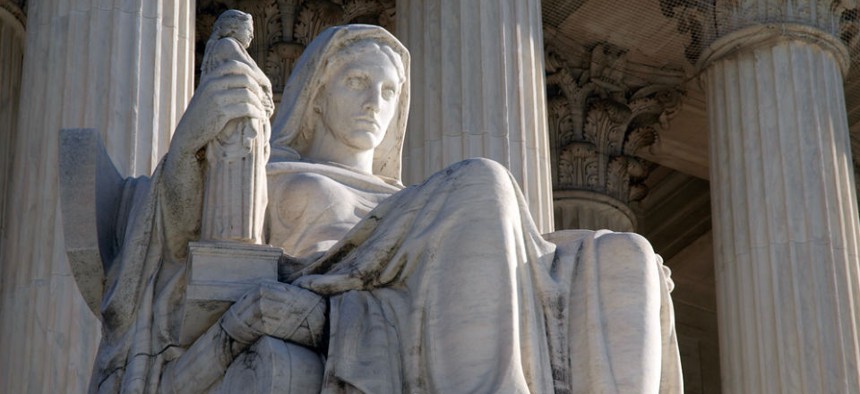
trekandshoot/Shutterstock.com
Air Marshal Whistleblower Wins Supreme Court Case
Robert MacLean ruling called victory for employee protections.
The Supreme Court on Wednesday ruled in favor of an air marshal whistleblower who went public with a Homeland Security Department move to reduce security coverage on long-distance flights, a 7-2 decision hailed by whistleblower advocates as a bulwark strengthening the Whistleblower Protection Act.
In Department of Homeland Security v. MacLean, the high court upheld an earlier Federal Circuit Court ruling favoring Robert MacLean on the legal issue of whether an agency rule merits the same status as a law in susceptibility to challenge by whistleblowers.
MacLean, who has been working in the storm window business in California since his dismissal from DHS in 2006, told Government Executive, “I am extremely humbled and grateful that the court decided on this case. Great people from non-government organizations, the U.S. Office of Special Counsel, Congress and the courts came together to make this happen. I hope this gives other federal employees more confidence in exposing wrongdoing.”
Homeland Security had argued that MacLean’s disclosures of a relaxation in anti-terrorism protections involved sensitive security information, a category of information created by an agency regulation. That meant, government attorneys argued, that he was not protected under the Whistleblower Protection Act because his disclosures were “specifically prohibited by law” or as “required by executive order to be kept secret in the interest of national defense or the conduct of foreign affairs.”
But the majority opinion, delivered by Chief Justice John Roberts, stated that “interpreting the word ‘law’ to include rules and regulations could defeat the purpose of the whistleblower statute” and allow an agency to insulate itself from a key section of the act that protects against retaliation by simply writing a regulation prohibiting whistleblowing. (Justices Anthony Kennedy and Sonia Sotomayor dissented.)
“The Supreme Court made the right call in protecting the rights of brave federal whistleblowers who risk their own careers to inform the public about significant threats to public safety,” said Special Counsel Carolyn Lerner, whose office has filed a friend of the court brief on behalf of MacLean. “Of grave concern,” that brief read, “is that agencies could abuse their regulatory power to over-designate the information that is to be prohibited from disclosure as a means of suppressing a broad swath of information and stifling whistleblowers. Likewise, agencies may selectively enforce such broad regulations to punish and deter whistleblowing.”
Government attorneys also argued that these particular regulations should qualify as law, because Congress required DHS to issue appropriate secrecy rules. But the court said it could find no such examples of “law” being used in this context.
Tom Devine, the legal director of the nonprofit Government Accountability Project who represented MacLean, said, “In the Supreme Court’s first case testing the Whistleblower Protection Act, freedom of speech won with an exclamation point. Federal Air Marshal whistleblower Robert MacLean’s 7-2 victory means that after defending his rights for over eight years he will have a chance to achieve justice.
“The only issue left is whether he was reasonable to believe that Department of Homeland Security plans to go AWOL during a more ambitious rerun of 9/11 endangered the public. The ruling is a historic victory for the right of individuals to make a difference through freedom of speech."
Rep. Bennie G. Thompson, D-Miss., ranking Member of the House Homeland Security Committee, said, "I'm pleased that the Supreme Court maintained the whistleblower protection Congress intended under the Homeland Security Act. The 240,000 employees of the Department of Homeland Security need to know that their employee rights are protected if they come forward with information about security vulnerabilities, waste, fraud or abuse.”
Mathew Tully, founding partner in Tully Rinckey PLLC, which also submitted a friend of the court brief, said, “the Supreme Court just delivered a reality check to agency leadership: You can’t make a regulation, call it a law, and use the regulation to punish whistleblowers. If you want to make laws, quit and run for Congress. If you want to run an agency, be prepared to hear from employees who, thanks to today’s decision, can blow the whistle on government fraud, waste and mismanagement without fear of retaliation justified by semantics.”
Speaking to Government Executive, Tully, who attended oral arguments, added that he found the decision surprising only in that it wasn’t unanimous. He said the decision was welcomed by his clients -- Blacks in Government, the Emerald Society of the Federal Law Enforcement Associations and the Federal Law Enforcement Officers Association.
And Tully predicted the ruling would clarify for federal employees what constitutes a protected disclosure while discouraging agency managers from being “able to bury their wasteful, fraudulent and abusive acts by marking all information related to its own wrongdoing as Sensitive Security Information.”
MacLean, however, is still not guaranteed restoration in his job as air marshal. “The ruling allows him to litigate the whistleblowing,” Tully said. “A loss would have been horrific.”
(Image via trekandshoot/Shutterstock.com)







